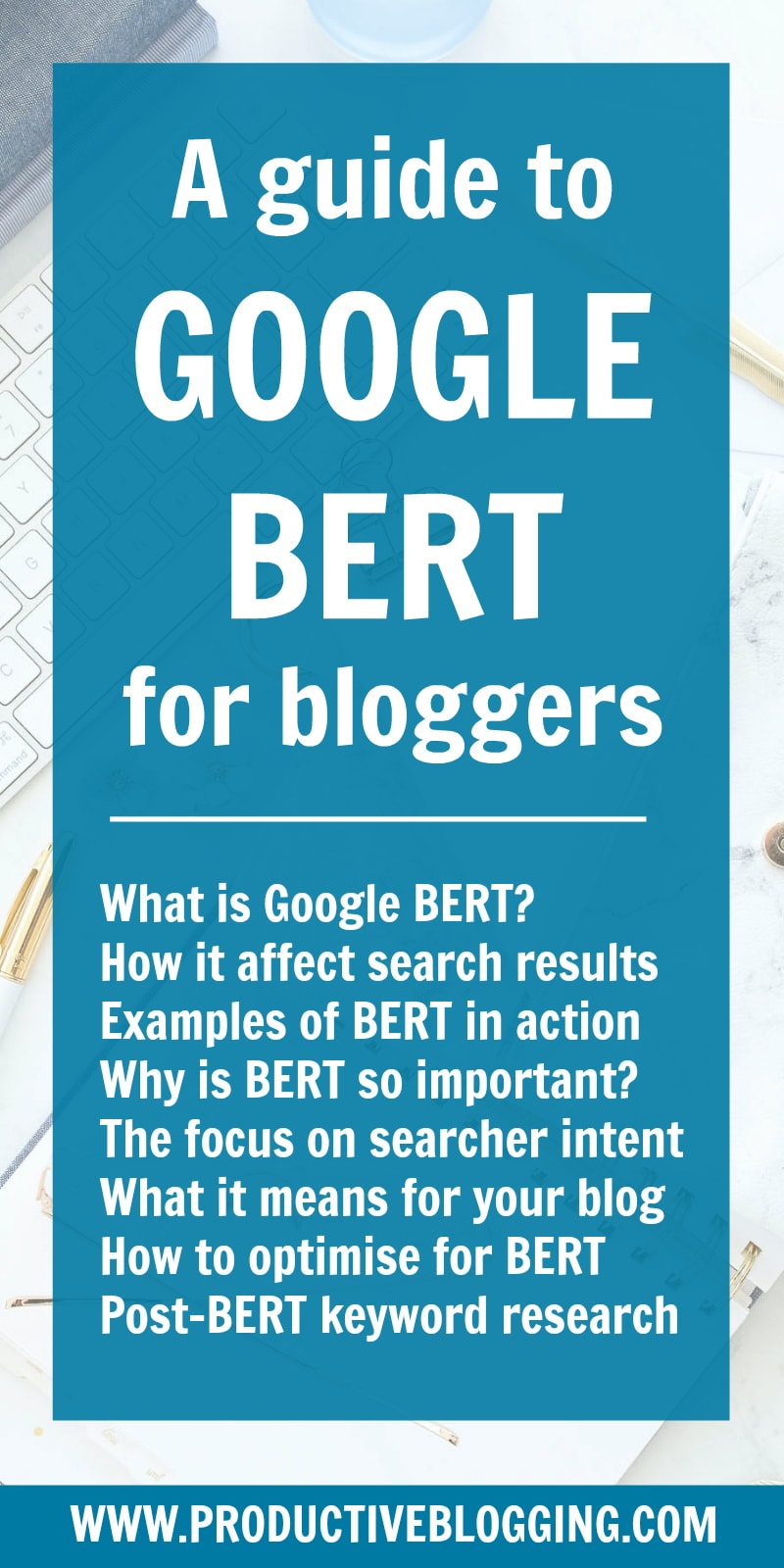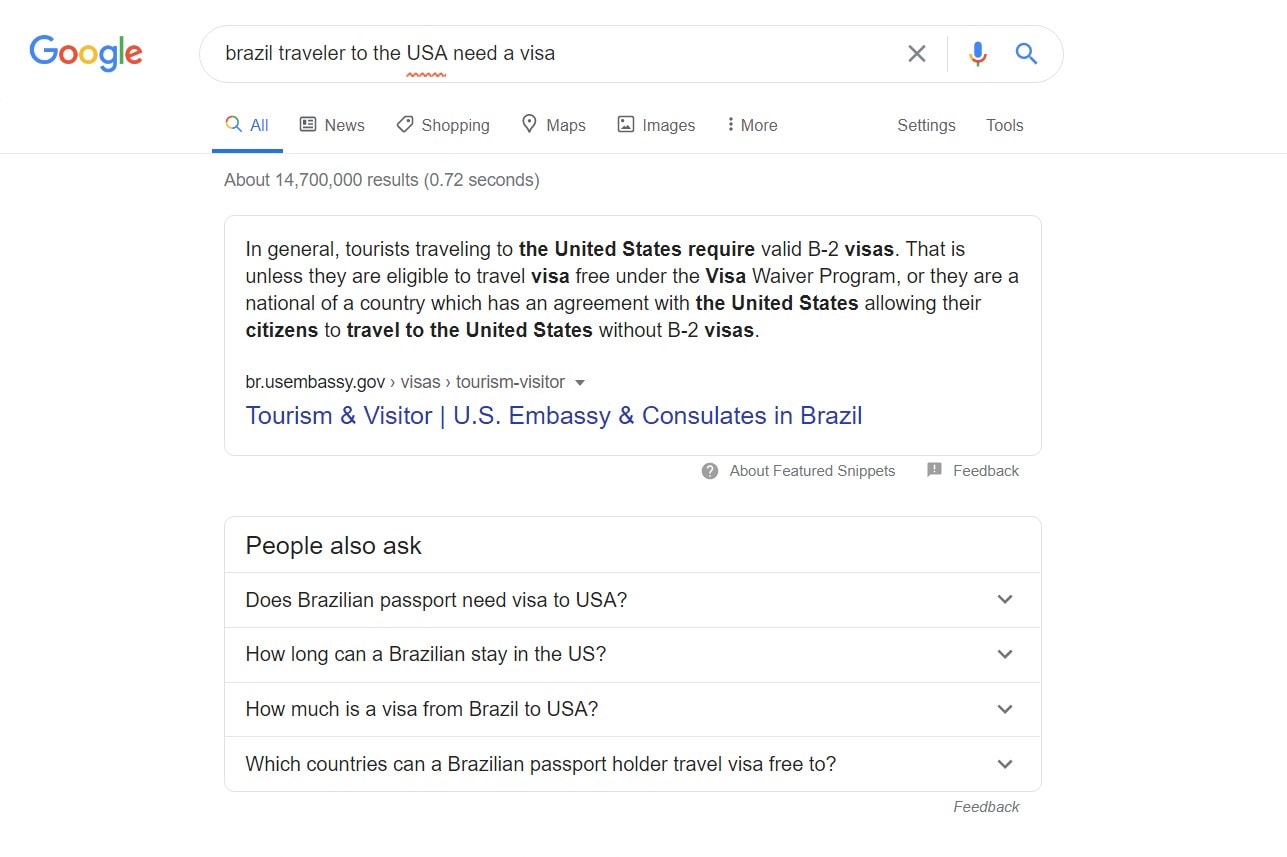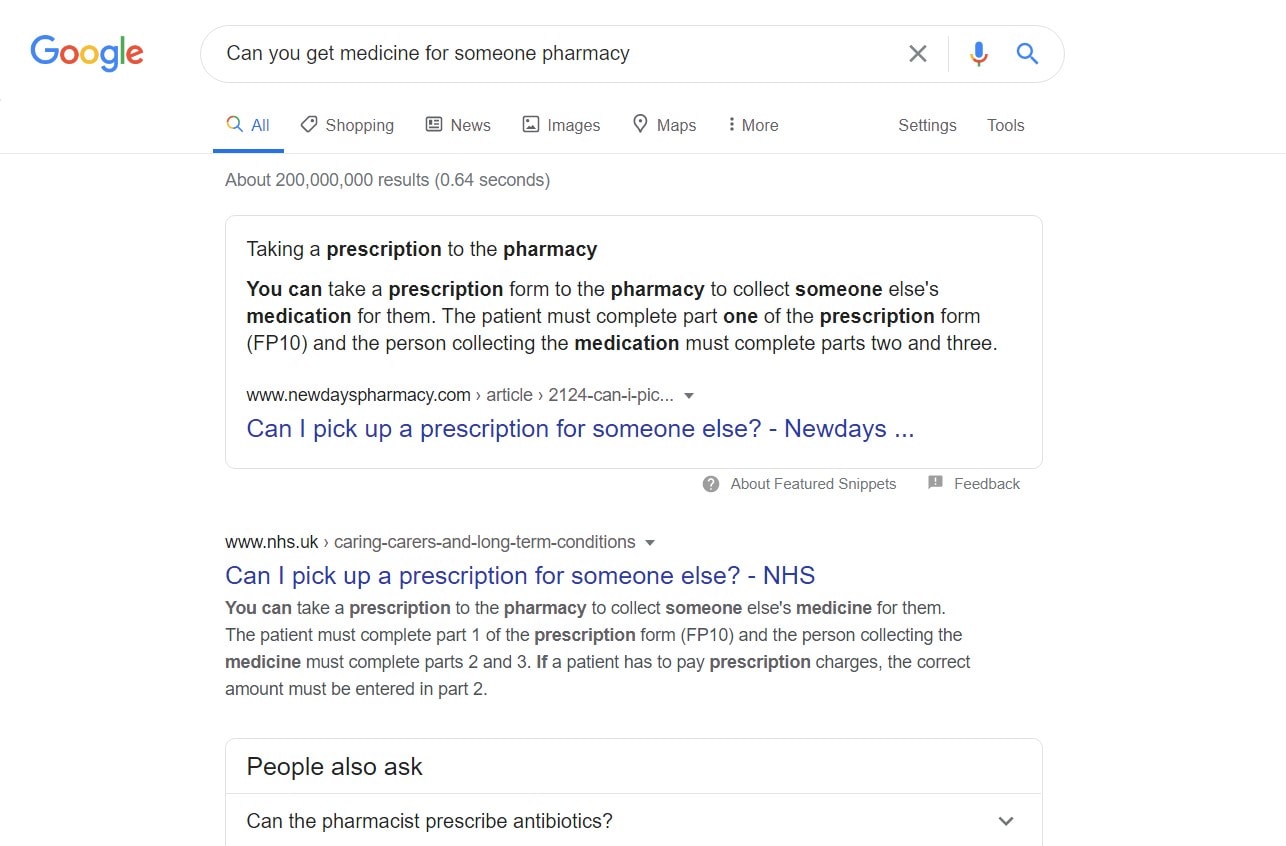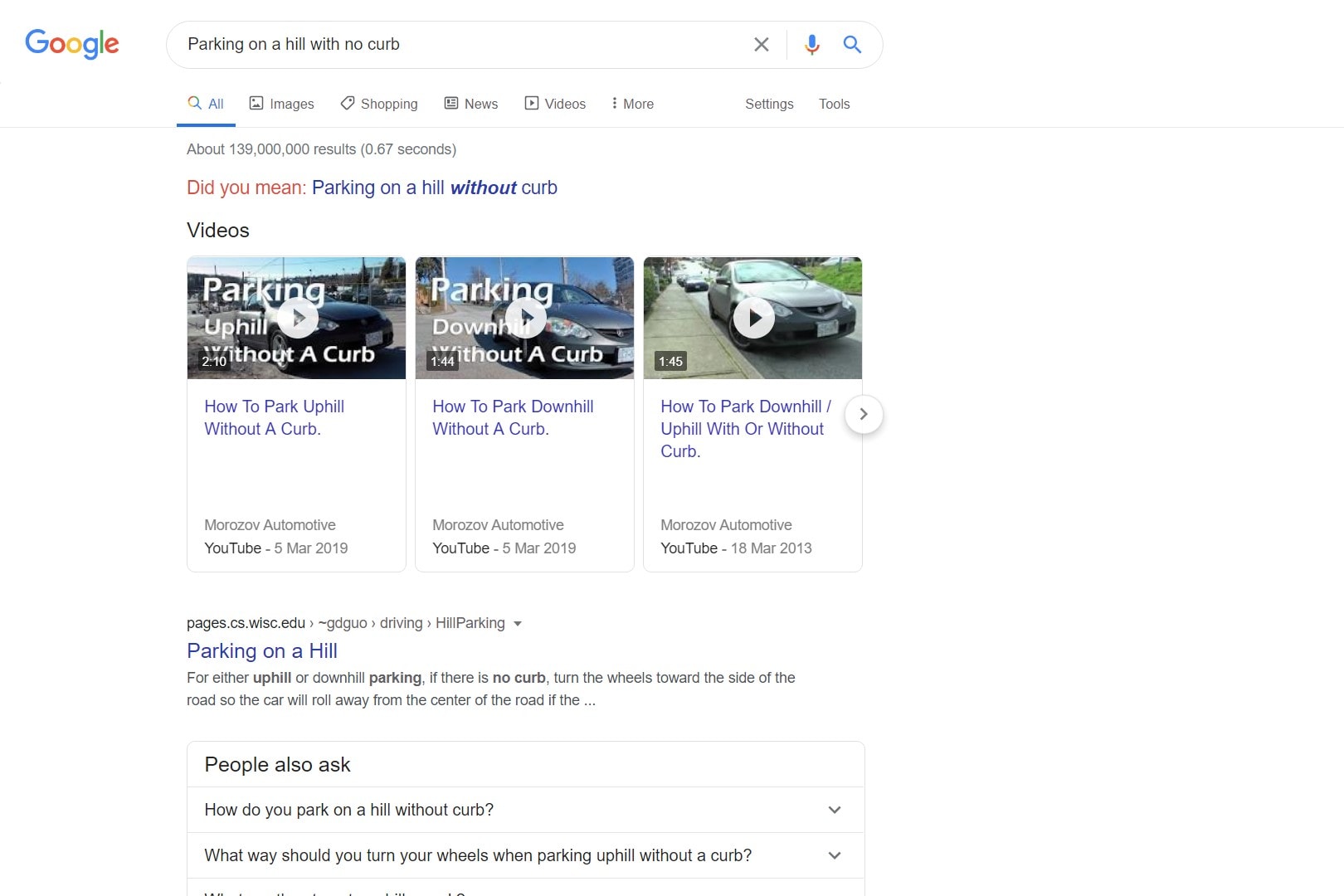What is Google’s BERT update? A guide for bloggers
I may get paid commission for purchases made after clicking a link in this post.
Google’s BERT update has big implications for what you should be blogging about, how to write blog posts and how to do keyword research. The better you understand BERT, the more likely your blog traffic is to grow. In this guide to Google BERT for bloggers, I’ll explain everything you need to know about this update!

Google is always updating its algorithm, but perhaps the most significant algorithm update of recent years has been Google’s BERT update.
Google’s BERT update is a significant step forward in search technology as it helps Google understand searcher intent in a much more nuanced way.
Because BERT allows Google to understand searcher intent better, this has a significant impact on how we as bloggers go about optimising our blog posts for Google traffic.
The better you understand BERT, the better you can optimise for it and the more likely your blog traffic is to grow.
In this guide to Google BERT for bloggers, I’ll explain exactly what BERT is, why this is such a significant shift in the way Google operates and how you can best optimise your blog content for BERT. I’ll also discuss how this update affects how you should do keyword research in the future.

What is Google BERT?
BERT stands for Bidirectional Encoder Representations from Transformers.
It might sound super complicated, but what it actually is, in layman’s terms, is quite straightforward. Google BERT is an algorithm update which allows Google to understand searches in a more nuanced way – in other words, it helps Google to understand searches like a human, not a robot!
This is important, because Google’s primary concern is delivering the best possible answer to a searcher’s query. If Google can better understand that query, it can provide a better answer.
How does Google BERT deliver better search results?
Google BERT delivers better search results for its users because it focuses less on keywords and more on the meaning of the sentence.
This is particularly relevant in:
- longer, more conversational queries,
- searches where common words like “for”, “to”, “no” matter a lot to the meaning
- searches in incomplete sentences or broken English (e.g. by non-native speakers)
Some examples of BERT in action
To understand this better, let’s look at some examples.
Google has shared some great examples of how BERT has changed Google’s understanding of a search query, resulting in a much better, more helpful answer.
Example 1: The Brazilian Traveler
“brazil traveler to the USA need a visa”.
To us, it is obvious that this query is about someone from Brazil who wants to travel to the USA.
However, before the BERT update, Google’s algorithm didn’t understand the importance of the word ‘to’ and actually understood this query the wrong way round. Consequently, the results were full of advice for travellers from the USA wanting to get a visa to go to Brazil – not very helpful!
With BERT, Google is able to grasp understand that the word “to” is actually very important here, and now provides a much more relevant result for this query.

Example 2: The Pharmacy Proxy
“can you get medicine for someone pharmacy”
Before BERT, Google did not grasp the importance of “for someone” in the query and so served up general advice about prescriptions.
Post BERT, Google understands that “for someone” is the particular concern in this query and serves up much more helpful advice about whether a patient can have a friend or family member pick up a prescription on their behalf.

Example 3: The Nervous Driver
“parking on a hill with no curb”
In the past Google placed too much importance on the keyword “curb” and ignored the word “no”, resulting in search results all about parking on a hill WITH a curb!
Now, with BERT, Google understands that “no curb” is what is important here and serves up much more useful advice – all about what to do when parking on a hill that DOES NOT have a curb.

Why BERT is so importanT?
BERT is a hugely important development. In fact, Google itself describers this as “the biggest leap forward in the past five years, and one of the biggest leaps forward in the history of Search”
The Google BERT update is estimated to affect 1 in 10 search queries. That’s HUGE! And means, almost inevitably it will be affecting your blog.
BERT is also significant because it really underscores the direction in which Google is travelling: away from “keywords” and “keyword phrases” and towards “searcher intent”.
In other words, as Google is getting ever more sophisticated, it is relying less and less on simply matching the keywords in the searchers query to the keywords in a blog post on that topic and more and more on seeking to understand what it is a searcher truly wants to know and then matching that to the most useful answer.
What does BERT mean for your bloG?
So what does this all mean for your blog?
Well, first of all it means if you want to get lots of Google traffic to your blog you need to sit up and pay attention to BERT!
The Google BERT update tells us a lot about Google’s direction of travel. Google is continually seeking to improve its algorithm so it can provide its searchers with better answers to their search queries and BERT helps Google do that.
Google is no longer simply focusing on the specific “keywords” used in search queries, but more and more focusing on “searcher intent” – what the searcher really wanted to know.
In many ways, the secret to getting the top spot on Google is the same as it always ever has been – to have the best answer to that search query.
Only with Google’s BERT update, Google is now EVEN BETTER at matching the best answer to each search query.
But because Google is now getting smarter, this opens up some really great opportunities for us as bloggers.
It means we can now write answers to much more complex search queries and have a much better chance of Google understanding that our blog post is in fact the best answer to the search query we were targeting.

How do you optimise your blog for Google BERT?
So how exactly do you optimise your blog for BERT?
There are 4 key things to focus on here:
1. Focus on searcher intent
The BERT update clearly signals Google’s continued focus on seeking to understand searcher intent and deliver the best answer for that intent.
If you want your content to perform well on Google, you need to focus on searcher intent for a specific search query and create high quality content that satisfies that search intent better than anyone else.
When you are writing a blog post, ask yourself, ‘What does a searcher who is sent to my blog post from Google really want to know?’ ‘What did they want to find when they were searching on Google?’ and ‘Does my blog post answer that intent?’.
For example, in this blog post, I could have waffled on at length about exactly how BERT works and its basis in “natural language processing” (NLP) and I could have explained terms like “semantic meaning” and “text cohesion”. But I didn’t because I knew that’s not what you wanted to know!
What you really wanted to know is ‘Is this important?’, ‘What does this mean for my blog?’ and ‘How can I optimise for BERT so I can get lots more Google traffic?’ So that’s what I have focused on!
2. Focus on more specific searches
BERT gives us as bloggers a huge opportunity. Now that Google understands long, complex search queries better, we can target those search queries and stand a much better chance of Google being able to match our blog posts up with those longer, more complex queries.
This means you can and should focus more on specific and more complex queries.
Additionally, BERT seems to apply particularly to “informational” queries – these are typically questions which start with what, when, where, who, why, and how. This presents a huge opportunity for us as bloggers to answer very specific questions in our niche.
If you want to do well when it comes to ranking for informational queries, it really pays to create high quality content which properly answers a very specific search query and to answer that question better than anyone else!
3. Worry less about “keywords”
Because Google now understands the nuances of language and the intent behind a query so much better, traditional “keywords” are becoming less important.
Instead of focusing on one specific “focus keyword” above all else, you should focus instead on writing high quality content which answers a specific “searcher intent”.
4. Use more synonyms and related phrases
This doesn’t mean you should throw the baby out with the bathwater and throw out the whole concept of keywords, but it does mean you should vary how you present your keywords.
Instead of doggedly repeating the same 3 word keyphase over and over again in your blog post, you should now focus more on using multiple different terms related to the topic – for example breaking your keyword up, using synonyms of your keyword and using related phrases.
In other words, you are now free to focus on writing natural, clear, helpful blog posts to answer specific search queries instead of being torn between creating well-written content for your audience and over-using one simple phrase for a machine!

How does Google BERT affect keyword research?
The last thing I want to touch on here is how BERT affects keyword research.
Google’s BERT algorithm had made it much easier to rank for long-tail “keywords” and more complex search queries. But the problem with these long-tail / complex / more nuanced keywords is that keyword research tools are HOPELESS at giving you accurate search volumes and competitiveness scores for such keywords.
In fact, if you type in a long complex keyword phrase into a keyword research tool and you’ll probably find it tells you the search volume is ZERO!
This is partly because keyword research tools are waaay less smart than Google and partly because keyword research tools are using much smaller datasets than Google. While this typically doesn’t cause too much of a problem with super high-volume keywords (the ones that are also super competitive!), it can lead to enormous inaccuracies on lower volume, long-tail keywords.
In fact, I have many blog posts on my site that get THOUSANDS of pageviews A DAY, and yet keyword research tools will tell me the search volume on those keywords is tiny (or zero!)
So if keyword research tools won’t help you with finding those long-tail / highly-specific / more nuanced search terms that BERT now allows us to rank for, what is the solution?
My usual advice in this instance is to use a combination of Google Trends, Google Search Results and my Keyword Research Calculator (as per this post on Keyword Research Step-By-Step).
However, even Google Trends is not always super helpful with really long tail, highly specific keywords.
In this instance the best tools for finding the high volume super specific search terms are all to be found on the Google search results page:
- Google’s autocomplete function (though beware of its bias towards things YOU have recently searched for!)
- The “People Also Ask” box
- The “Related Searches” section
The queries in these areas in the search results page give an incredible insight into WHAT people search for on any given topic and HOW people phrase their search queries.
When doing keyword research, use these 3 areas to guide you towards popular search terms on any given topic in your niche. Make a note of these search terms and then type them into Google to get an idea of the competitiveness of those search terms.
Finally use my Keyword Research Calculator to rank your ideas in order of potential – this will tell you which phrases are likely to send you the most Google traffic.
You should then optimise the resulting posts using the exact phrasing found on Google as well as synonyms and related phrases.
READ MORE >>> How to use Google Search Results for keyword research
Over to you…
I’d love to hear if this blog post has helped you or inspired you to approach SEO / keyword research differently from now on! Let me know in the comments below 😀

- A beginner’s guide to SEO for bloggers
- How to actually DO keyword research – step-by-step
- How to optimize your blog posts to win Google featured snippets
- How to write the perfect blog post (for search engines AND your readers)
- How to write longer blog posts (that your readers actually want to read!)
Don’t miss a thing!
Follow me on Twitter, Facebook and Instagram. Or why not subscribe to Productive Blogging and get blogging and productivity tips straight to your inbox every week?
Pin this post to read later


What a great article, Eb! I had heard of BERT but never fully understood how to work with it. Your explanation of keyword research is highly appreciated. Thank you so much for taking the time to write this article.
Thanks, Nicole! I am so pleased to hear that this helped you. Eb 🙂
The article is very interesting and effective, really explains everything in detail.Thanks you and good luck .
Hi Pinky – I am so pleased you found this article helpful! Eb 🙂
Great explanation! I’m happy to see that BERT will actually help those of us who are using the KGR method 🙂
Thanks Alexia, I’m glad this helped you! Eb 🙂
Thanks Eb – spot on as usual!
Aw, thanks Veronica! Glad you found it helpful 😀